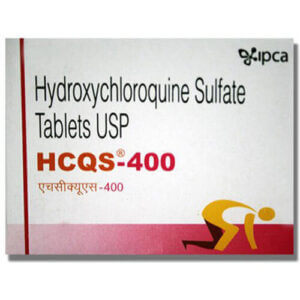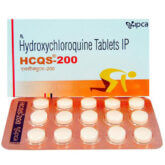Description
Hydroxychloroquine: Uses, Side Effects, Precautions, and How to Use
Hydroxychloroquine Sulfate is a long-established medication used to treat conditions such as malaria, lupus, and rheumatoid arthritis. People have recently expressed interest in using it to treat COVID-19, but it is unclear whether it is effective in this capacity. In this blog post, we will talk about the different ways hydroxychloroquine is used, how to take it, and what to be careful of.
How is Hydroxychloroquine used?
Hydroxychloroquine Sulfate is primarily used to treat malaria, a disease caused by a parasite carried by mosquitos.
It is also used to treat autoimmune disorders like lupus and rheumatoid arthritis. These conditions can be exceptionally painful and trying for those who suffer from them. Lupus is chronic, attacking multiple organs in the body. Arthritis can make daily tasks a hurdle with persistent joint pains. Hydroxychloroquine affects the parasite or the immune system depending on the condition being treated.
Is it helpful for COVID-19 patients?
According to some studies, hydroxychloroquine can help reduce the severity of the symptoms and shorten the duration of the illness. It’s important to note these studies have not been consistent, and more research is needed to determine whether hydroxychloroquine truly works for COVID-19. Currently, only doctors can use hydroxychloroquine to treat COVID-19.
How is Hydroxychloroquine Sulfate used?
Hydroxychloroquine Sulfate is usually taken as tablets that are swallowed. The amount and when to take it depends on your illness, how old you are, how much you weigh, and your overall health. You need to follow your doctor’s instructions and take medicine exactly as they tell you to. You should not stop taking the medication without talking to your doctor, or else you might worsen your symptoms or cause other problems.
Side Effects of Hydroxychloroquine
Like all medications, Hydroxychloroquine Sulfate can cause side effects. These are among the most frequently reported adverse reactions:
- Nausea
- Vomiting
- Diarrhea
- Abdominal pain
- Headache
- Dizziness
- Blurred vision
- Skin rash
- Mood changes
Talk to your doctor immediately if any of these unwanted effects become unbearable.
Severe adverse reactions to hydroxychloroquine are very unusual but can include:
- Seizures
- Hearing loss
- Heart problems
- Liver damage
- Blood disorders
- Allergic reactions
Do not waste a minute if you notice these side effects, and contact your GP immediately.
What precautions should be kept in mind?
Before taking Hydroxychloroquine Sulfate, it is important to inform your doctor if you have any of the following conditions:
- Allergies to medications or other substances
- Liver disease
- Kidney disease
- Heart disease
- A history of seizures
- A history of vision or hearing problems
- Pregnancy or breastfeeding
In addition, hydroxychloroquine can interact with other medications, so be sure to inform your doctor of any other medications you are taking, including over-the-counter medications and supplements.
What are some of these interactions?
Drug interactions refer to the effect that one medication has on another medication when taken concurrently or the effect that a medication has on the body’s ability to process another medication. There is always a chance that one medicine will adversely react with another. Users need to be careful because Hydroxychloroquine Sulfate is no exception to this rule.
Some drugs that might interact with hydroxychloroquine include:
- antacids,
- digoxin,
- cyclosporine,
- and certain antibiotics.
These interactions can reduce the effectiveness of the medication, increase the risk of side effects, or cause other complications. To reduce the likelihood of negative drug interactions, your doctor can determine if hydroxychloroquine is safe for you to take, and if so, adjust your dosage or medication schedule as needed. Always follow your doctor’s instructions to the T when taking hydroxychloroquine and report any changes in your symptoms or health.
If you are prescribed hydroxychloroquine, it’s important to take it exactly as your doctor tells you and to let them know about any other medications you are taking to avoid any harmful interactions.
How to use Hydroxychloroquine SULFATE
Take this drug by mouth, generally with food to help stomach worried, exactly as directed by your croakers. The lozenge and length of treatment are grounded on your medical condition and response to treatment. In children, lozenge is also grounded on weight.
To help malaria, take this drug by mouth as directed by your croakers, generally formerly a week on the same day each week. Mark a timetable to help you remember. Continue to take it daily while in the area and for 4 to 8 weeks after leaving the area, or as directed by your croakers. To treat malaria, follow your croakers’ instructions.


